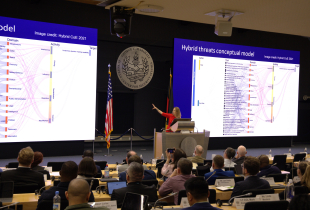73 Cyber Graduates Join Global Network of Marshall Center Alumni
GARMISCH-PARTENKIRCHEN, Germany — The George C. Marshall European Center for Security Studies wrapped up its Program on Cyber Security Studies on May 15, after three weeks of focused strategic collaboration and professional development in the critical and evolving cybersecurity domain.
“Thank you for being here. It speaks to your professionalism, your dedication to the mission, and your commitment to advancing global security,” said Bernard Finel, Ph.D., dean of the College of International and Security Studies. “The real work begins now — strategy isn't about what you want, but what you’re willing to work for and deliver. I encourage you to take the insights from this seminar, stay connected with one another, and continue building meaningful outcomes for your nations and for our shared security.”
The program convened 73 cybersecurity professionals from 53 countries, spanning ministries of defense, foreign affairs, and national security agencies. Throughout the course, participants engaged in lectures, panel discussions, scenario-based workshops, and seminars that examined the complex cyber threat landscape and explored policy solutions to strengthen cyber resilience at all levels.
“Cyber is not a national issue. Cyber is an international issue, and no single nation can face these challenges alone,” said Rolf Wagner, Marshall Center German deputy director. “It is through collaboration, trust, and shared expertise that we build the resilience our future demands.”
Designed to bridge the gap between technical experts and decision-makers, PCSS equips rising and senior-level leaders with a foundational understanding of cyber terminology, legal frameworks, strategic policy considerations, and operational planning tools.
The program’s curriculum highlighted responsible state behavior in cyberspace, public-private partnerships, the protection of critical infrastructure, and the implications of emerging technologies such as artificial intelligence and quantum computing.
Participants also heard from distinguished speakers including Ambassador Maria Adebahr, Germany’s director for Cyber, Foreign and Security Policy, and leading experts from Brazil, Nigeria, Finland, the U.S., and NATO institutions. Through open dialogue and case studies, participants explored the operational and legal complexities of cyber incidents, advancing their understanding of cyber diplomacy and defense cooperation.
PCSS alumni now lead national cyber offices, support whole-of-government coordination, and advise ministers across multiple regions. That growing network, built on trust, operational familiarity, and shared norms, serves as a force multiplier for U.S. and allied efforts to collectively address regional, transnational, and global challenges in an increasingly contested information environment.
Jamila Ade, deputy director of the Cyber Crimes Unit at Nigeria’s Federal Ministry of Justice, spoke to the lasting value of the relationships built during the program. A returning alumna, Ade previously attended PCSS in 2023, returning for the 2025 course as a speaker and seminar leader.
